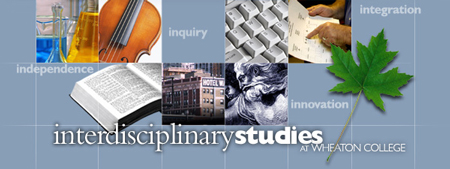The nature of the Interdisciplinary Studies at Wheaton College can be summed up in the following concepts - all beginning with the letter "I".
Independence
IDS provides students with the freedom to design a program of study that reflects their academic passions and concerns.
However, with freedom comes responsibility. Consequently, IDS is not for everyone. Only those who are highly motivated and personally disciplined should consider this option. Students must complete a detailed application and go through a careful interview process before being accepted to the IDS major.
The purpose is to help students recognize, from the beginning, just how unusual IDS is and how demanding it can be. Those students who want to pursue academic rigor and accept personal responsibility will thrive in IDS. To create an IDS program of study is, in a real sense, to cut your own path to knowledge.
Innovation
The result of independence and inquiry is often innovation--the act of making something new.
IDS majors are expected to use their creative energies to produce good work, both in their chosen courses and in their final research project. The project will take one of three predominant forms, depending upon the chosen academic disciplines: quantitative analysis; qualitative interpretation; or creative expression.
By using and developing the four literacy skills--reading, writing, speaking, and listening--the IDS major discovers effective ways to gain knowledge and to express understanding.
God is incredibly creative, as demonstrated by the diversity of His universe. Similarly, IDS majors are encouraged to push themselves toward creative ways of thinking and expressing themselves.
Inquiry
Inquiry begins with curiosity--to ponder the nature of things as they are, and as they might be.
The striking thing about much of higher education today is the emphasis upon information without the cultivation of curiosity or inquiry. IDS majors are not content with mere facts. They want to understand the significance of those facts in the context of a bigger picture.
IDS students have a genuine desire to ask questions no one else will ask and to find answers, difficult as they may be, that others may overlook. Cultivating an attitude of inquiry is crucial to the IDS major.
Integration
From designing a program of study, to choosing thematically congruous courses, to completing a major research project—IDS majors must have a sense of the why behind the what.
In other words, they must have the inclination to investigate how various aspects of knowledge from across the disciplines actually relate. Whether from the arts, social sciences, humanities, or natural sciences, the interrelation of various facets of learning is of utmost importance to the IDS major.
Cross-disciplinary integration of ideas and methodologies is the ultimate goal of IDS, always from a biblical perspective.

